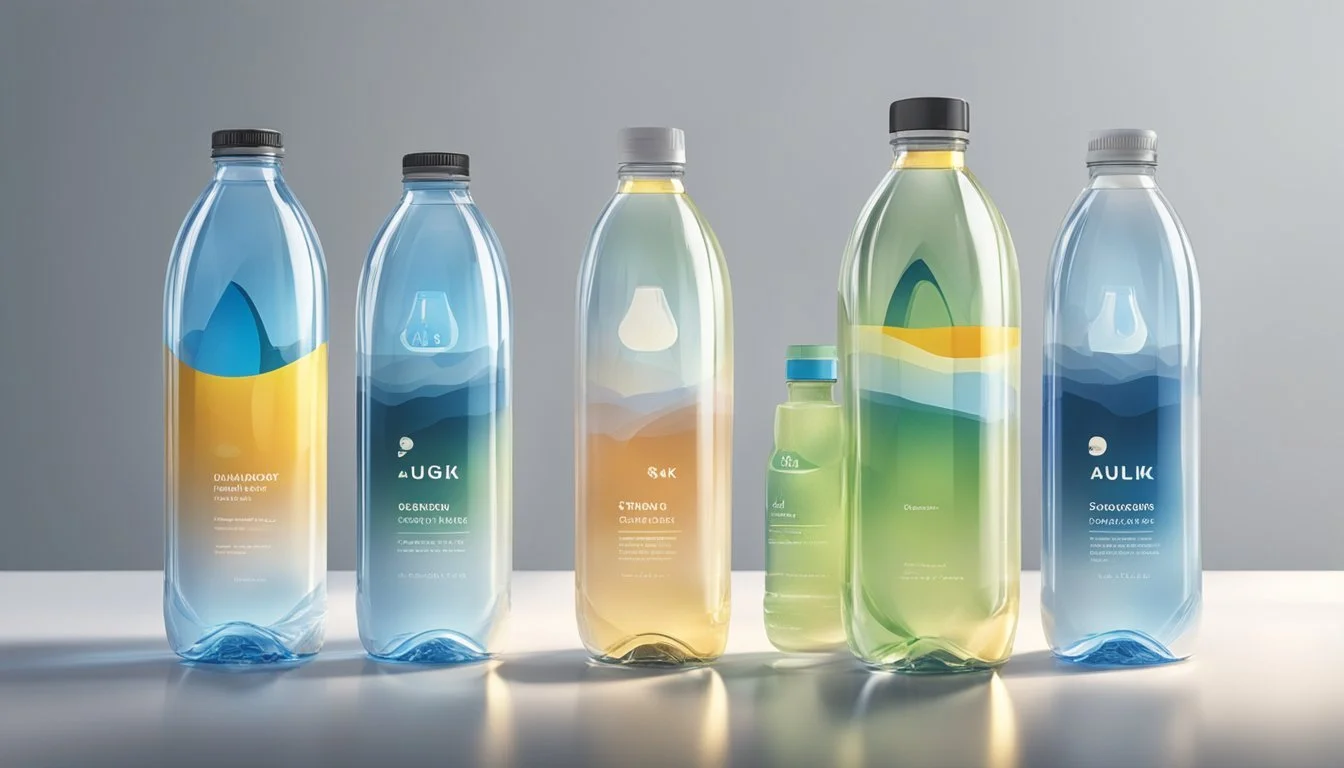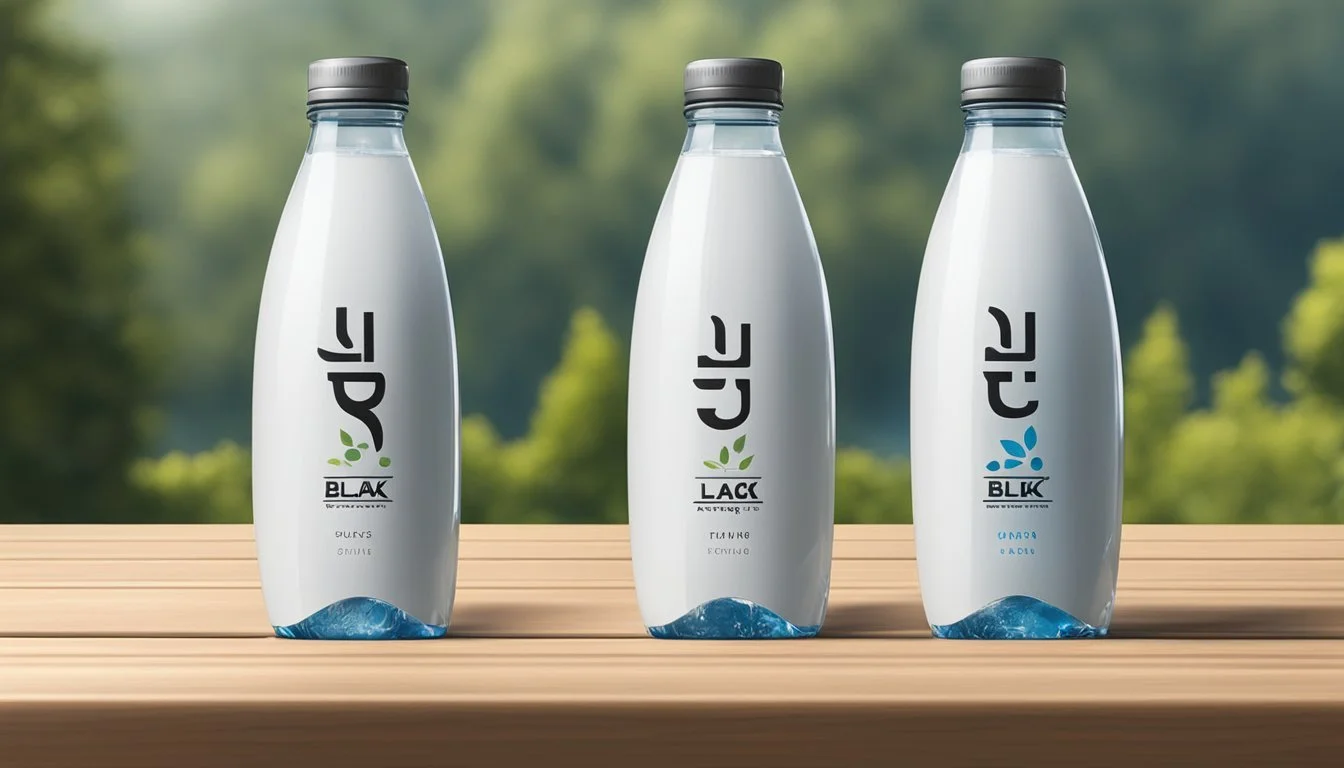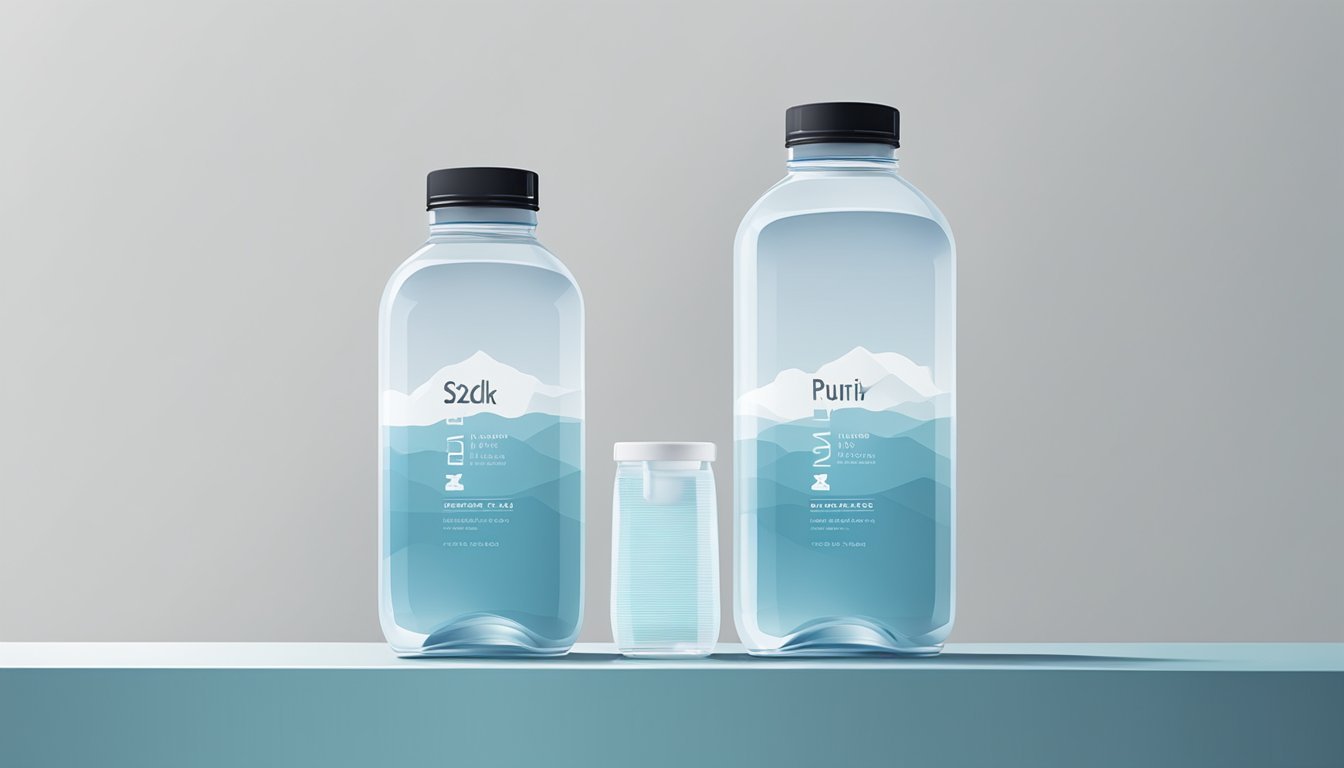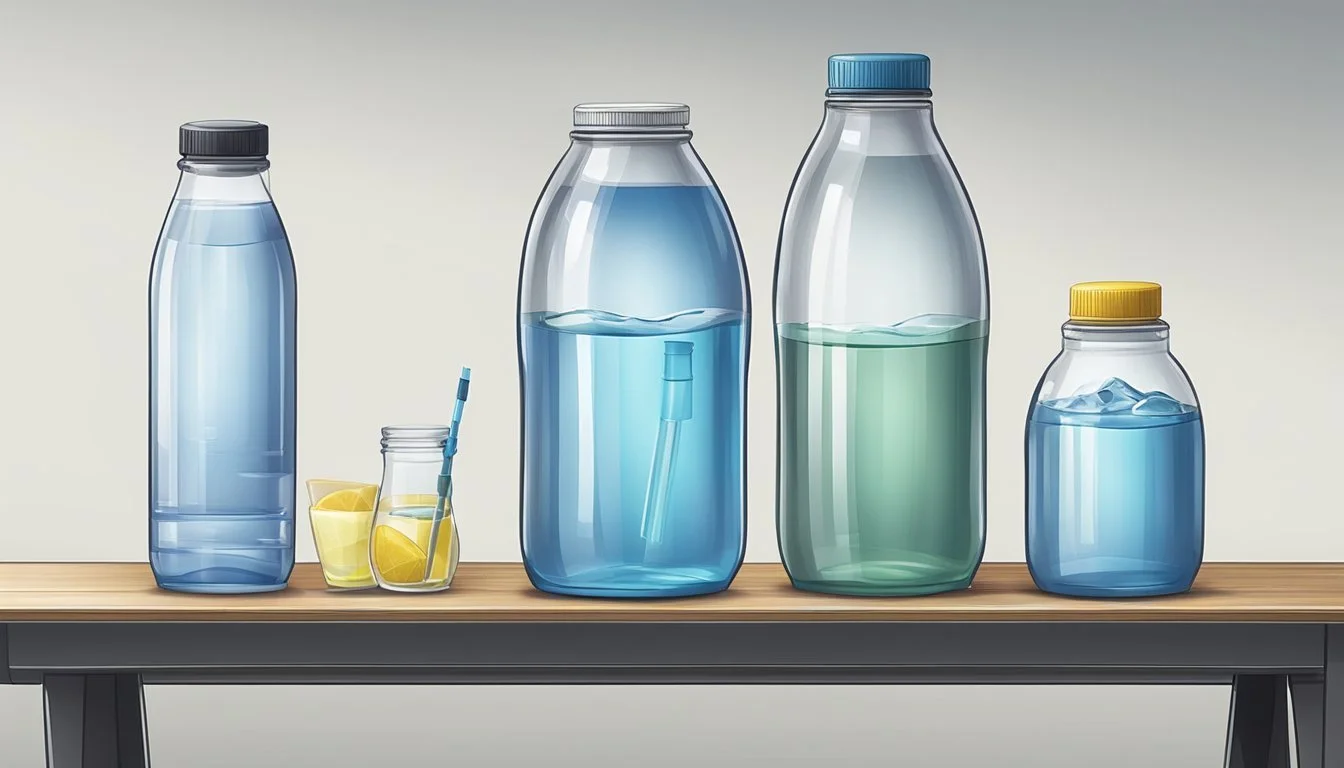Augi vs. Blk
Comparing the Best Bottled Waters
Choosing the right bottled water often comes down to personal preference and health benefits. Augi and Blk are two brands that have garnered attention in the market. Augi is known for its purity and refreshing taste. Blk. Water stands out with its unique black appearance, which stems from the addition of fulvic trace minerals believed to offer health benefits.
Consumers looking for a visually striking option might lean towards Blk due to its deep obsidian hue and potential wellness advantages. Augi, on the other hand, offers a more traditional, clean taste, appealing to those who prefer a classic hydration experience.
Ultimately, when it comes to picking between Augi and Blk, taste preference and interest in potential health benefits from added minerals likely guide the choice. Each brand brings something distinct to the table, making them worthy contenders in the bottled water market.
History and Brand Overview
Augi originates from an entrepreneur's bold journey into the alkaline water market, while Blk stands out with its visually distinctive product and intriguing health claims.
Augi: Origin and Growth
Augi Water was co-founded by Augustine Amoakohene, a 23-year-old entrepreneur. His transition from streetwear aficionado to health-focused businessman resulted in the creation of a bottled alkaline water brand.
This venture capitalized on the increasing demand for healthier water options. Amoakohene's innovative approach has allowed Augi to capture a slice of the US bottled alkaline water market, which is projected to grow significantly.
Augi's reputation is bolstered by its branding and the youthful visionary behind it, appealing particularly to a younger, health-conscious demographic.
Blk: Brand Evolution and Market Impact
Blk Water, recognized by its deep black hue, has disrupted the bottled water market. The brand leverages its unique appearance and fulvic trace minerals, aimed at offering potential health benefits.
The product fetches a high price point compared to traditional water brands. This pricing reflects both its unique properties and targeted upscale market positioning.
Blk Water has managed to spark substantial interest and discussion. Despite concerns over single-use plastic packaging, it maintains its allure through innovative branding.
Composition and Health Benefits
Both Augi and Blk offer unique compositions and health benefits. Augi focuses on providing essential minerals and hydration, while Blk emphasizes detoxification and nutrient absorption.
Mineral Content and Added Nutrients
Augi is known for its rich mineral composition and added nutrients. It contains essential minerals like calcium, magnesium, and potassium, which are vital for maintaining bone health and muscle function. The added minerals help in meeting daily nutrient requirements.
Blk, on the other hand, includes fulvic trace minerals. These minerals are believed to support overall health by improving nutrient absorption and providing additional trace elements that may not be abundant in a regular diet. The composition of Blk aims to complement a well-rounded dietary intake.
Hydration and Electrolytes
Hydration is a key focus for Augi. The water is enriched with electrolytes, such as sodium, potassium, and magnesium. These electrolytes help maintain fluid balance, support muscle and nerve function, and are especially beneficial for those engaging in physical activities.
Blk also offers hydration benefits through its alkaline water composition. Alkaline water is believed to regulate the body's pH levels and improve hydration efficiency. The electrolytes present in Blk assist in fluid balance but with the added benefit of alkaline properties, which may enhance overall hydration.
Detoxification and Nutrient Absorption
Blk stands out for its detoxification properties. The fulvic acid trace minerals in Blk are suggested to help remove heavy metals and toxins from the body. This detoxifying effect can support the body’s natural detox processes, contributing to better internal health.
Nutrient absorption is another benefit touted by Blk. The fulvic minerals are thought to enhance the absorption of other nutrients, ensuring that the body gets the maximum benefit from the food and supplements consumed. This feature makes it an appealing choice for those looking to maximize their nutritional intake.
Tasting Profiles
Augi and blk. water differ significantly in their flavor and texture profiles, offering unique experiences to their consumers. Understanding these distinctions helps in making an informed choice between these two brands.
Flavor and Texture
Augi originates from the Leesburg, Va., municipal water supply. It is purified but retains a slight sulphuric taste that can sometimes come across as fishy. This unique aspect isn't necessarily a drawback for everyone, as it adds a distinct character to Augi's profile.
blk. Water, on the other hand, is often described as having a neutral or very subtle flavor. This minimal taste makes it preferred by those who dislike any strong aftertaste in their water. The inclusion of fulvic minerals doesn't significantly alter its flavor, ensuring blk. remains mild and easy to drink.
Texture-wise, both Augi and blk. offer a smooth drinking experience, but blk. slightly edges out due to its less noticeable aftertaste.
Water Sommelier's Assessment
Water sommeliers provide expert insights into the subtle nuances of different bottled waters. They typically note that Augi's slight sulphuric flavor may appeal to those looking for a more complex tasting profile. The fishy undertone, although present, is mild and not overpowering.
From a professional perspective, blk. water’s neutral taste is praised for its clarity and refreshing quality. The lack of any significant aftertaste allows the natural hydration properties to shine through. The addition of fulvic minerals is viewed as a subtle enhancement rather than a dominating element.
Both waters provide a premium experience, but the choice between them depends largely on personal flavor preferences and textural expectations.
Source and Purity
When exploring the origins and purity levels of Augi and blk. water, it's crucial to understand the distinct sources they each come from and the processes they undergo to ensure purity. This comparison will highlight how each brand sources and treats their water.
Natural Sources vs. Purified Water
Augi Water originates from natural spring sources, ensuring it is grounded in geological formations that naturally filter the water. This process imparts a unique mineral profile, enhancing both taste and nutritional value. Spring water is often seen as superior due to its natural filtration and mineral content, which is usually preferred by consumers seeking a more "natural" experience.
Blk. Water, on the other hand, is a purified water that undergoes an extensive filtration process before fulvic trace minerals are added. Despite being purified, it’s distinguished by its deep black color due to these minerals. Unlike spring water, purified water like blk. water relies on modern filtration technology to remove impurities, ensuring consistency in quality regardless of the source.
Assessing Purity Levels
The purity of Augi Water is maintained through natural filtration. Water percolates through layers of soil and rock, which naturally filter out contaminants. This process results in water that’s free from industrial pollutants and retains beneficial minerals, meeting high standards for purity due to nature's own processes.
Blk. Water achieves its purity through advanced filtration methods. These methods typically include reverse osmosis and carbon filtration, which remove almost all contaminants. The addition of fulvic trace minerals, while beneficial, does not compromise its purity. The filtration ensures that blk. water meets stringent safety and purity standards, even though its unique color might suggest otherwise.
By contrasting these elements, consumers can better understand the origin and purity of each water type and make informed decisions based on their preferences for natural mineral content or advanced filtration methods.
Packaging and Sustainability
Both Augi and Blk are committed to reducing their environmental impact through innovative packaging and sustainability efforts. Key considerations include the materials used in their bottles and the initiatives they have in place to reduce their carbon footprint.
Bottle Materials and Environmental Impact
Augi uses glass bottles, which are 100% recyclable and help maintain the taste quality of the water. Glass is an inert material with a long lifespan, reducing landfill waste when recycled properly. Their packaging aims to minimize environmental harm and support a circular economy.
Blk, on the other hand, opts for plastic bottles. While modern plastics can be recycled, the overall environmental impact of plastic remains significant. Recycling rates for plastic are lower compared to glass, and plastics can contribute to ocean pollution. Augi’s use of glass marks a clear advantage in terms of reducing long-term environmental damage.
Sustainability Initiatives
Augi invests in various sustainability initiatives, including sourcing materials from sustainable suppliers and engaging in carbon offset programs. They prioritize renewable energy in their manufacturing processes and promote low-carbon transportation methods to reduce their overall carbon footprint. Their sustainability reports are transparent, offering insights into their progress and challenges.
Blk focuses on increasing the recyclability of its products by using PET plastic, known for being one of the more recyclable types of plastic. They are actively involved in community clean-up programs and partner with organizations to improve recycling infrastructure. Blk also works to reduce water usage in production, demonstrating a commitment to broader environmental conservation efforts.
Cost Factor
When evaluating the cost of Augi and Blk bottled waters, the price per bottle is a key consideration. Blk water is priced between $2 and $4 for a 16-24oz bottle. This places it at the higher end of the market.
Augi water is generally more affordable. A typical 16-24oz bottle costs $1 to $2. This makes it a more accessible option for everyday hydration.
To provide a clearer comparison, consider the cost per ounce:
Blk Water: Roughly $0.12 to $0.25 per ounce
Augi Water: Approximately $0.04 to $0.08 per ounce
Cost per Essential Minerals
Beyond just the price per ounce, the value can also be assessed by considering the mineral content. Blk water boasts an infusion of fulvic trace minerals, which is a unique selling point. Augi claims to offer natural mineral content as well.
While Blk water's premium pricing can be justified by its unique ingredients, Augi presents a cost-effective alternative without the hefty price tag.
Market Variety and Consumer Choices
In the bottled water market, consumers face a wide array of choices, each brand offering unique attributes. Understanding the differences can help purchasers make the best decision for their needs.
Comparing Different Water Brands
The bottled water market boasts a multitude of options, from spring waters like Mountain Valley, to artesian options such as Fiji. Pure Life from Nestlé, Aquafina, and Dasani are among the mainstream choices. Premium brands like Voss, Acqua Panna, and Icelandic Glacial cater to those seeking luxury. Functional waters like LIFEWTR and Smartwater often appeal due to added electrolytes or enhanced purification processes.
Spring waters like Evian and Poland Spring tout natural sources, marketing themselves as pure and untouched by human intervention. Alkaline waters like Core Hydration and Eternal Water attract consumers looking for potential health benefits. Different packaging options, such as Boxed Water and unique appearances like blk. Water, also influence consumer preferences. Factors like taste, perceived health benefits, and brand reputation play vital roles in this competitive market.
Choosing the Right Bottled Water for Your Needs
Selecting the right bottled water depends largely on individual needs and preferences. For hydration enthusiasts prioritizing taste, options like San Pellegrino and Crystal Geyser may be ideal due to their mineral content. Those looking for eco-friendly choices might lean towards Boxed Water or brands emphasizing sustainable sourcing.
People concerned with purity might gravitate to Icelandic Glacial or Penta, known for their high purification standards. On-the-go consumers often choose brands like Smartwater for its added electrolytes. For those who prefer flavored or sparkling varieties, San Pellegrino or Dasani offer interesting alternatives.
Ultimately, whether prioritizing taste, health benefits, or environmental impact, the sheer variety ensures that there is a bottled water to meet every individual’s needs.
Nutritional Analysis
This section focuses on the vitamin and mineral content of Augi and Blk Water to help health-conscious consumers make an informed choice. It covers the Recommended Daily Allowance (RDA) and evaluates health benefits.
Vitamins and Minerals RDA
Augi Water primarily sources its water from the Leesburg, Va., municipal supply. It is a purified water but may not be rich in essential minerals. It doesn't explicitly list minerals like calcium, magnesium, potassium, or sodium on its nutritional labels, making it difficult to gauge its contribution to daily nutritional needs.
Blk Water stands out for its infusion of fulvic trace minerals. The product contains zero calories, zero sugar, and zero carbohydrates. Key minerals include calcium, magnesium, potassium, and sodium, essential for cellular function and energy production. Blk Water's dark color is due to these minerals, particularly fulvic acid, which is believed to assist in gut health.
Evaluating Water for Health-Conscious Consumers
For consumers keen on nutritional benefits, Blk Water presents a more compelling case. The presence of fulvic acid and its associated minerals can be advantageous, particularly for those looking to improve cellular function and overall energy levels.
On the other hand, Augi Water may lack detailed mineral disclosure, which could be a concern for those needing specific micronutrient intake. While both waters serve to hydrate, the additional micronutrient profile in Blk Water offers more than basic hydration, contributing to nutritional wellness.
Comparatively, Blk Water's higher price point reflects its enriched mineral content, offering a premium hydration option for the health-conscious.
Legislation and Industry Standards
The bottled water industry in the United States operates under strict regulations to ensure safe drinking water for consumers. Federal, state, and trade associations establish and monitor these standards.
At the federal level, the U.S. Food and Drug Administration (FDA) regulates bottled water. The FDA sets requirements for labeling, manufacturing practices, and quality standards.
State governments may impose additional regulations that complement federal guidelines. This dual layer of regulation helps maintain higher safety and quality levels.
The International Bottled Water Association (IBWA) also plays a vital role. Established in 1958, the IBWA enforces a voluntary code of standards among its members. These standards often exceed federal and state requirements.
For detailed comparison, here's a summary of key legislation and standards:
Regulatory Body Key Responsibilities FDA Sets labeling, quality, and manufacturing standards State Governments Implement additional regulations as needed IBWA Enforces a voluntary code with stringent standards
Regulations focus on various types of bottled water, including spring, mineral, purified, and artesian. Each category must meet specific criteria before it hits the market.
Despite stringent regulations, some issues raise concerns. For instance, the FDA's oversight has been cited as under-resourced. This could impact the thoroughness of inspections and enforcement.
The industry's commitment to recycling and sustainability is also evident. Legislation supporting recycling aims to reduce environmental impact and promotes the responsible use of resources.
Regulations and standards collectively ensure that bottled water remains a reliable and safe drinking water option for consumers.
Final Thoughts
When comparing Augi and blk. Water, several factors come into play. Each brand offers distinct advantages, catering to different preferences and needs.
Flavor and Texture
Augi: Crisp and refreshing, suitable for those who prefer traditional taste.
Blk: Unique flavor and mouthfeel, providing something different.
Nutritional Benefits
Blk: Infused with fulvic trace minerals and added electrolytes for enhanced nutrition.
Augi: Pure and reliable, often appreciated for its simplicity.
Appearance
Augi: Clear, typical appearance of bottled water.
Blk: Distinct dark hue, making it visually striking and curious.
Consumer Feedback
Augi: Generally positive reviews for taste and reliability.
Blk: Mixed reviews; many enjoy the unique flavor, though it's not universally liked.
Price Point
Both brands have varied pricing, with blk. sometimes positioned as a premium product due to its unique attributes.
In decision making, consumers should consider what matters most to them—whether it's traditional purity, nutritional additives, or a novel drinking experience. Each option brings unique elements to the table.
Ultimately, the choice between Augi and blk. Water may come down to personal preference and specific needs.








